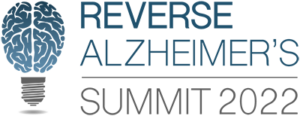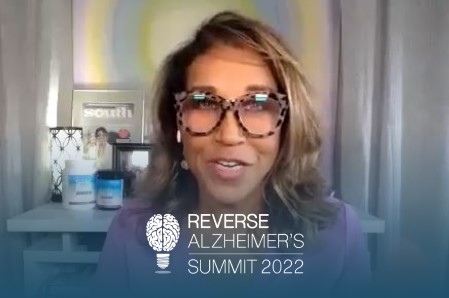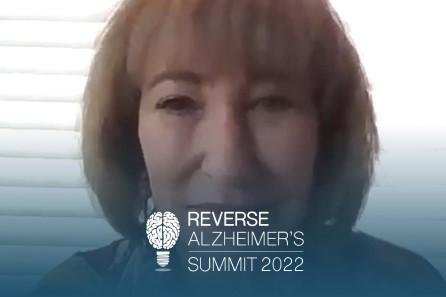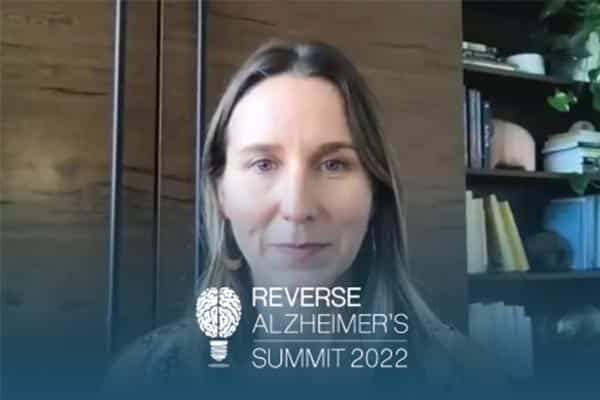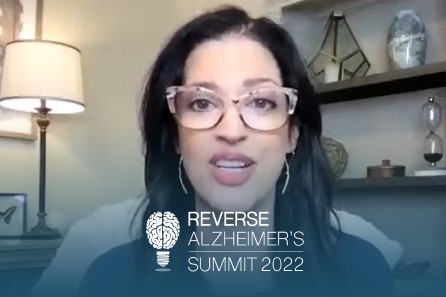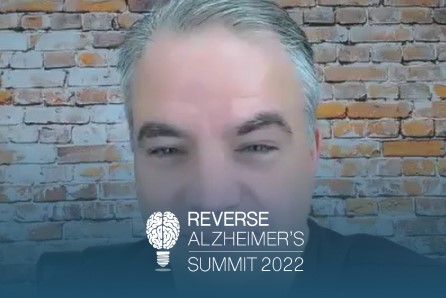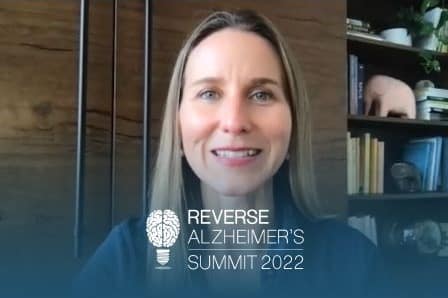Join the discussion below

Dr. Heather Sandison is the founder of Solcere Health Clinic and Marama, the first residential care facility for the elderly of its kind. At Solcere, Dr. Sandison and her team of doctors and health coaches focus primarily on supporting patients looking to optimize cognitive function, prevent mental decline, and reverse... Read More
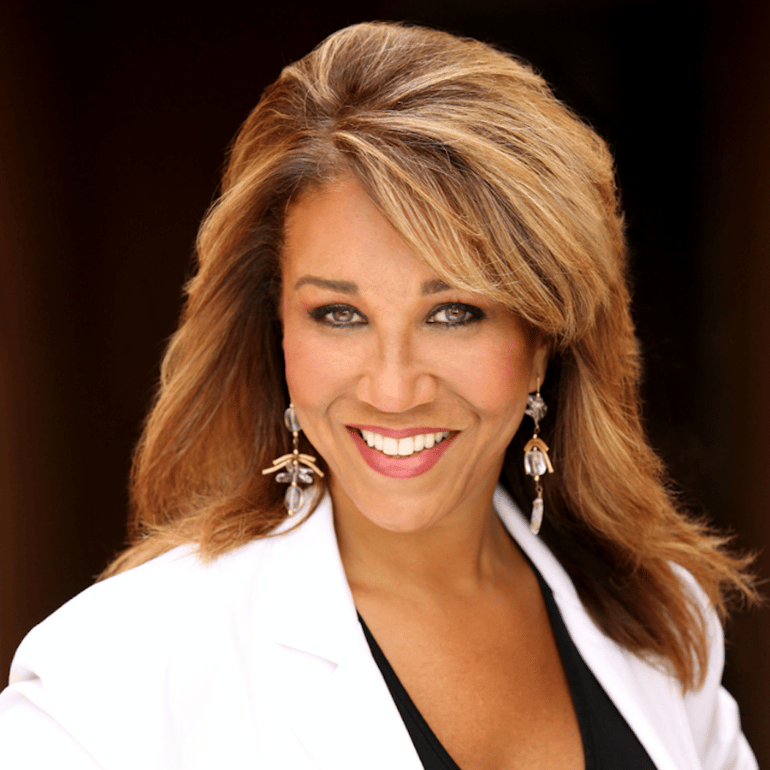
After discovering the hidden cause of midlife weight gain and fatigue in women, OBGYN Dr. Kyrin Dunston lost a life-changing 100 lbs. and fixed her adrenal fatigue. She is fellowship trained in Anti-Aging, Metabolic and Functional Medicine and has practiced this exclusively for over a decade. A pioneer of female... Read More
- Why sex hormones should be called flex hormones;
- How to get maxiumum impact from your hormone replacement to create balance;
- What most people get wrong when thinking about menopause
Heather Sandison, N.D.
Welcome to this episode of the Reverse Alzheimer’s Summit. I’m your host, Dr. Heather Sandison, and I’m so excited to introduce you to Dr. Kyrin Dunston. She has, welcome. After discovering the hidden cause of midlife weight gain and fatigue in women, she lost a life-changing hundred pounds and fixed her adrenal fatigue. She’s fellowship trained in anti-aging, metabolic and functional medicine, and has practiced this way exclusively for over a decade. She’s a pioneer of female hormonal justice. Dr. Kyrin hosts “The Hormone Prescription Podcast” with new episodes every week. She’s the founder of The Hormone Club, an end-to-end all inclusive membership, providing women access to state-of-the-art natural hormone therapy treatment throughout the U.S., and the Midlife Metabolism Institute, providing educational and coaching programs for women at midlife, to fix their hormones and their metabolism and their health for life. She’s been featured on CBS, NBC, and “Reader’s Digest”, “The Huffington Post”, “First for Women”, “Best Self”, and others. She’s your midlife metabolic ninja who will show you the steps to take you to unleashing your best help yet. I love it, and she’s a ton of fun! Welcome.
Kyrin Dunston, M.D.
Thank you for having me, Heather. I’m super glad to be here.
Heather Sandison, N.D.
So Kyrin, we were introduced because you have a deeply personal story around dementia. So I wanna dive into all of the nitty-gritty of hormones and how they affect the brain. And just add your voice to the chorus of others that are saying hey, like we haven’t always gotten it right, and there are changes we need to make in terms of how we think about hormones and cognitive function, as women age. But first, tell us what happened with your mom.
Kyrin Dunston, M.D.
Yeah, so I will try not to cry, but if I do it’s okay. But I remember the first day my mom couldn’t remember my name. And it was very upsetting. And now, unfortunately, she doesn’t even know who I am. It took years for that progression to happen. But this was like the healthiest woman I knew. I was born and raised in Manhattan, she was like a die hard New Yorker. Rent controlled apartment from before my sister was born. She walked everywhere. She went to the theater, had friends. She had many different professional careers. She had a career in architecture, then she was like a public relations director for national Avis Rent-a-Car, then she was the public relations director for the national YWCA. Like this is an intelligent, bright, active woman. Later in her life she decided she wanted to be a chef. She went back to chef school. She trained at the, I forget the name of the French chef institute in Manhattan, and then went to the Natural Gourmet cookery school. This brilliant woman. Sorry, I’m having animals pipe in here. And she taught me how to follow my dreams. And then all of a sudden she doesn’t know my name, and then she’s not paying her rent on her rent controlled apartment. And the next thing you know, she gets kicked out ’cause she didn’t pay her rent. Fast-forward now, she’s in assisted living. She has to have around the clock care because she’s basically reduced to a child. And so I ask myself the question any daughter would ask. Like, why, why is this happening? And you know, I always let my family members, they have their own relationships with their doctors.
I can’t be everybody’s doctor, nor should I be involved at that level. And she had doctors she trusted. And so she followed their recommendation and they believed the same thing that I was taught, that hormone therapy is not necessary. And so when this happened and she got the diagnosis, she had been in menopause three decades. And so when I learned this, I was like oh, she’s been without, in what I call hormonal poverty. Hormonal poverty. Just like financial poverty is when you don’t have the finances to pay for your life needs and expenses, hormonal poverty is when you don’t have the hormones to fund your body processes. She had been in there for three decades. And I saw the data, when she first went into menopause, of course, I was just regular OB-GYN. Didn’t even know what I didn’t know. Didn’t know I was hormonally illiterate. Had my own journey of having health problems, weighing 243 pounds, having chronic fatigue, where I just slept and worked. Depression and anxiety so bad that I was on five prescription medications, even though I had nothing to be depressed or anxious about, my hair was falling out, I had irritable bowel, no sex drive. I looked and felt 20 years older than I was. And so I saw all my patients at midlife with the same problems, and the pill for every ill medicine I learned in med school wasn’t working, and it wasn’t working for me and all my tests were normal. And so then it was one of my patients who came in, who I wasn’t really helping, and she came back a year later looking like a new woman. And I said, well, what did you do? And she said, oh, I went and saw this doctor, and she did these tests you never did for me. And she balanced my hormones, which you never did for me. And it was very humbling, but I heard what she said and so then I said I’m gonna look into this, and I did.
And I discovered this whole world that I wasn’t trained in, in my OB-GYN and med school training, that really was how to heal the body. Not just throw pill for every ill or surgery for every symptom band-aids. So I transformed my own health, and this was about 10 years ago, and then dedicated my life to doing this work with women. So my mom had already been in menopause for decades, but I let her have her relationship with her providers. I didn’t interfere. And so when she got this diagnosis, I was like oh, hormones. And that just started me on this whole other journey. And I know some of the data is staggering now on, I mean the major organizations that govern hormone therapy have pulled back since the Women’s Health Initiative, which we can talk about if you want. They don’t even now recommend hormone therapy as first line treatment for osteoporosis. They only recommend it for two symptoms of menopause, hot flashes and vaginal atrophy in the shortest dose possible for the least amount of time, as if it was something horrible. When the data clearly shows that it reduces our risk of neurodegenerative diseases, Alzheimer’s, heart disease, heart attack, stroke, cardiovascular disease, blindness, macular degeneration, like the list is so long. And the article in “The New England Journal of Medicine” about hormone therapy is associated with a 77% reduction in neurodegenerative diseases. But we are not giving this to all women in menopause who are in hormonal. I’m just like, this is why when I heard about your summit, I was like, no, if I could prevent one woman from ending up like my mom, it will have been worth it. But that’s a little about my story.
Heather Sandison, N.D.
Thank you for sharing. This is, there’s suffering happening in the world right now when it comes to dementia that I think is unnecessary. And it just, it breaks my heart every time I hear one of these stories, and women, particularly women of color are disproportionately affected by dementia. And so they, and they also aren’t the ones that get included in the trials and we don’t shine as much light on what’s going on in the female brain and in this stressed female brain. And so we don’t know. However, even though we don’t know for sure, like there’s no magic bullet that we’ve found for dementia, there is so much that we know that can help certainly prevent and oftentimes reverse cognitive decline. And hormonal therapies are absolutely a critical component of that. So with that in mind, I wanna kind of just drive this conversation in the direction of like, what’s the nitty-gritty? Like how does estrogen, progesterone, testosterone, pregnenolone, how do all of these, DHEA, whatever, there’s probably some I’m missing, well of course. How do all of these sex hormones interfere, interact, or support cognitive function?
Kyrin Dunston, M.D.
Right, that’s a great question, Heather. So most people hear sex hormone and they think it’s only about sex reproduction libido in women. And nothing could be further from the truth. I say, we shouldn’t just call them sex hormones, we should call them flex hormones. Why? Because they have flexible functions. Sex and libido and reproduction happens to be one of them. But it’s like a small fraction of the myriad powerful impacts that these hormones have. And we’re talking about estrogen, progesterone, and testosterone. Yes, women have all three and we need all three. And one of the primary functions is in the brain. So these hormones are anti-inflammatory. They work to decrease inflammation and they work in the nervous system to help heal. Like progesterone in particular is so neuroprotective that it’s now used in cases of traumatic brain injury. So even when men have traumatic brain injury, like football players, right, if they get a concussion, that’s a traumatic brain injury, they are dosed with high dose progesterone to stabilize their neurologic tissue because that is one of its functions. So if we only think about them as sex hormones, we miss the point. You have receptors in your brain for these, you have them in your eyes. Rates of macular degeneration are increased in women who don’t have hormone replacement. That’s a leading cause of blindness in older women. And then, and heart too. But in terms of the brain, they’re all important. Estrogen, progesterone and testosterone, particularly progesterone. So they are neuroprotective, and that’s kind of the brain connection. And it is a part of not only reversing cognitive decline, but preventing it.
Heather Sandison, N.D.
So, so, so important. And so what happens like around midlife, and I think people think menopause, it’s like this one moment where you’re, like the light switch gets flipped, right? Like you’re in and then you’re out. But really it’s this, for anybody who’s been through it they can tell you right away, it’s this process, it’s a transition, a long transition for some, and a painful one for many. What kind of changes are happening then, and how do you support women going through that?
Kyrin Dunston, M.D.
Right, so we’re programmed at birth with the number of eggs that we have. That’s how many we get for life. And then when we hit puberty, we start maturing one every month, sometimes two if you’re in a twin family, and then many more thousands disintegrate every month till by the time you’re about 35, you have such a low reserve you’re considered what we call advanced maternal eggs, your eggs are old, quote unquote, and you’re at risk for increased chromosome anomalies. And the hormonal production from the ovary starts going down of estrogen, progesterone, and testosterone, around about the age of 35. But you might not notice it ’cause it happens so subtly and gradually. Most women notice it by the time they’re somewhere in their 40s, ’cause you’re on this trajectory of it going down. So at some point you’re gonna notice something. One of the most common symptoms is irregular periods, ’cause progesterone is the menstrual timekeeper and that’s usually one of the first hormones impacted. So whereas like with me, I’m usually like 28 days, you could set your calendar by it, all of a sudden it wasn’t coming at 28 days. Your periods can be more heavy or painful. But even though I had been through my OB-GYN training and I technically knew that these other health problems could be associated with it, what I find universally is that that goes unnoticed by most women, and by me, right? So I was like, oh I can’t sleep, I have a sleep problem. Never occurred to me, oh that’s my sex hormones, because it was drilled into me, these are sex and reproduction hormones. So I never thought, oh, a hormone problem, fix that and I’ll sleep. I thought it was a separate problem, and I find most women think that and they’re going to their doctors, oh I have insomnia, so their doctor’s giving them a sleeping pill.
I had irritable bowel thinking, I went to the gastroenterologist, I didn’t know if I was gonna have, poop five times in a day or not for five days. And that’s very common for women. Didn’t think, oh, this could be related to my hormones, so I went to the gastroenterologist, they gave me an antispasmodic. I didn’t really get the impact. Now knowing what I know since I went and did fellowship training and antiaging metabolic and functional medicine, now I’m hormonally literate and I get that, oh my gosh, this is all about hormones. So we’re programmed this way at birth. So it happens to all of us then around the age of, average age of 51 in the U.S we go through menopause, and that pretty much is the complete cessation of hormone production by the ovaries that make the majority of your estrogen, your progesterone, and half of your testosterone. And all three are important for your neurologic function. You will get this, a lot of doctors talking about that oh, like testosterone isn’t important for women, and I find that women think this too.
They’re like, oh, I don’t need that. Or they think it’s only about sex drive. It’s so interesting to me how the conversation, when it comes to women and testosterone, is only ever about it’s important for sex drive. In fact, they did in 2019 a review of the literature, kind of symposium on reviewing the use of testosterone in women, and all they discuss is it’s used for sex drive. They didn’t talk about the fact that testosterone is vital for neurologic function, for neurotransmitter balance, mood disturbance, cognitive functioning, no mention of it. They didn’t talk about that testosterone is important for maintenance of muscle mass. One of the main reasons women gain weight as they age is because we lose muscle mass, partly ’cause we don’t have enough testosterone, and how testosterone helps to maintain that. And they didn’t talk about its effect on mitochondrial density, right? Mitochondria are powerhouses that fuel everything in our bodies. So anyway, I think you get my point. So these hormones are super important. Women are programmed at midlife to have a decline, and to ignore that I think is malpractice.
Heather Sandison, N.D.
Well, so you, yeah, yeah criminal. So you’ve described a handful of things, of places where these hormones have a really big impact that we’ve kind of ignored, because we call them sex hormones, which is this misnomer that really misguides people. So the things that you mentioned are extremely debilitating, like when we think about, many of us are in denial and don’t wanna think about it, right? Like I’m never gonna get old. That’s never, I’m never gonna get macular degeneration. I’m never gonna have osteoporosis. I’m never gonna have dementia. And we just kinda shut it out. But part of the reason is because we feel so hopeless and helpless around it. But what you’re describing and the dots that you’re connecting are that estrogen, progesterone, testosterone, these hormones, they’re not just sex hormones, but they protect us from some of the most debilitating diseases of aging. So when we think about like what, breast cancer, you know, breast cancer is kind of what comes up when we talk about estrogen replacement, especially about hormone replacement. People are afraid of breast cancer. And not that I want anyone to ever be diagnosed with breast cancer, but when we think about breast cancer, it’s pretty treatable, right? Like we do screening, we look for it, we cut it out, we get rid of it. And even radiation these days is not the radiation of the 1980s. But when we think about macular degeneration, slowly losing your vision, being dependent on others, having a fall and the risk of death basically, and debilitation after breaking a hip or having a significant fall, the loss of dignity that comes with having a progressive neurodegenerative disease like Alzheimer’s, these things are what make those last years of life, that last decade and sometimes more of life just so depressing, so sad, so not compelling, both for ourselves and for our loved ones, right? They make it expensive and it’s a series of doctor’s visits and of not remembering the name of your daughter. And if we can prevent that, even for some subset of the population, by intervening at this level, it’s criminal not to. It is malpractice not to.
Kyrin Dunston, M.D.
Right, I agree. You bring up so many good points in there. So my mom’s care, $8,500 a month. She has no idea who anyone is. I know she didn’t plan on spending her last years this way. And neither did we. Gosh, whenever I talk about her then I, my mind goes blank ’cause I see her face. Okay, so you’re right. We are phobic about talking about death. We are death phobic in our culture. We don’t wanna talk about it. Like it’s not gonna happen to all of us. We need to get over that, but I think particularly for women, the reason we don’t wanna talk about it is because it is so dismal, because we’re not getting the treatment that we need and frankly deserve. And we are basically being left to hang out to dry for the 30, 40, 50, or more years that we live in menopause. We’re in hormonal poverty. We don’t have these nourishing hormones nourishing all the cells in our body. So what happens, it is death by deterioration and it’s slow and painful, and nobody’s doing anything about it. So I don’t know, have you seen “Menopause The Musical”, Heather?
Heather Sandison, N.D.
No. It sounds entertaining.
Kyrin Dunston, M.D.
Before I did my summit, Stop The Menopause Madness, my friend said to me, who was one of the experts in there, she’s like, oh, did you see this musical? I said, no. She said, oh my God Kyrin, you’ve got to go see it. And this is how we came up with the name, Stop the Menopause Madness. Because she said, you go to “Menopause the Musical”. She said, first off when you walk in, they give you a fan with your program. And then all the women are sitting down, and it’s all these middle aged, overweight women, and every musical number is about making fun of something at midlife about menopause. Like how we’re overweight and we’re tired and we have no sex drive and we need coffee in the morning and wine at night and chocolate. And she said, they’re all laughing and fanning themselves. And she says, everyone’s just laughing. And she said, tears were rolling down my face. She’s like, we’re so hopeless that we think our only choice is to make fun of ourselves. We have to stop this madness. And I was like, yes, we’ve got to stop this menopause madness. And that’s what birthed the Stop the Menopause Madness summit. But I think it’s true. Like even, and I have to say that I can’t blame the doctors because I was trained that way too, and so I didn’t even know what I didn’t know until I knew it. And the only reason I knew it is ’cause my health was in the gutter, and then I had to get this information. So then when my mother’s came, I was like, oh.
But they don’t even know what they don’t know. And they so believe the paradigm that I’m gonna say that they’re brainwashed in, ’cause I was brainwashed in it too. I literally went home and told my mother, when I went to med school, so she had this great lifestyle, very holistic. She was good friends with Gary Null who owned this health food store. Like she made her own granola. Like she was super, we called her Granola Gerry. And I came home from med school and I told our mother we heal with steel, which she probably had to suppress her laughter. And she never said I told you so when I went on my journey, but then I see what happened to her. And so I think you can go too granola and be like, oh, I’m doing menopause naturally. I don’t need hormones. And it’s so funny, I’ll just add this Heather, because I say no woman ever got a diagnosis of osteoporosis from her doctor, and was told that her calcium and vitamin K and vitamin D were low, and that she needed to take them and went, oh, I’m not taking calcium and vitamin K and vitamin D. I’m doing osteoporosis naturally. But this insanity that we women have internalized, the misogynistic culture that has put a value on us needing hormone therapy for our very brain function, heart function, for our lives. We’ve internalized that and turned it against ourselves that it’s something bad. And I’m sorry, that shit has to stop.
Heather Sandison, N.D.
Fair enough. So I wanna get into a little bit of the criticisms around this, and I mentioned breast cancer.
Kyrin Dunston, M.D.
Oh yeah.
Heather Sandison, N.D.
And you’ve mentioned the Women’s Health Initiative study. And so I wanna talk about like why people feel like this isn’t safe. I can’t tell you how many patients I’ve had where I’m like all right, you have cognitive decline. We can measure it, it’s happening. You are at risk for dementia. You have APOE44 status. Let’s get you on some hormones. And they go home and they’re like well, my neighbor’s a nurse, and she told me that hormones are gonna give me breast cancer. So I don’t wanna do that. And I’m just sort of flabbergasted every time. But I’ve read the literature. And so talk us through when you have these conversations with people.
Kyrin Dunston, M.D.
Right! So this whole issue of estrogens and hormones are gonna cause me to have breast cancer. So flat out, no. So the first thing I like to say is, I like to appeal to someone’s common sense. If estrogen caused breast cancer, number one, who has the highest estrogen? Well, 20 to 30-year-old women. So who would have the highest rate of breast cancer? 20 to 30-year-old women. Do they? No. Okay, number two. If estrogen caused breast cancer, everybody who has estrogen would have breast cancer. That’s every man on the planet, every woman on the planet. Does every man and woman have breast cancer? No. Everything nature gave you, it gave you because it keeps you healthy. So this concept that anything that you naturally have is gonna cause you harm is insane to begin with. Now let’s go back and look at some of the studies. The literature clearly says that synthetic artificial hormones, equilin, which is horse estrogen, which is not human estrogen, medroxyprogesterone acetate, or brand name Provera, brand name Premarin for the equilin, they will increase your risk of breast cancer. Biologically identical, natural hormones, exactly that you naturally have, when given at the appropriate physiologic levels and balanced appropriately, will not cause breast cancer. The studies also show that if you do get breast cancer and you happen to be on hormone therapy, it will be found earlier, it will be a more easily treatable type, and you will not die from it.
And overall, if you use hormone therapy, your longevity will be on average two years longer than every other woman, whether or not you get breast cancer. You have lower rates of heart attack and heart disease, the number one killer of women over 50 that no woman’s scared about. You’ll have lower rates of blindness, dementia, all these things we’re talking about, better quality of life. So doctors are ignorant about this, and people are ignorant about this. Why? Because of the Women’s Health Initiative study about 20 years ago, came out. They did this large multi-trial in California, I think it was at Kaiser, 15,000 women, and they looked at synthetic hormones, Premarin and Provera in combination. And they stopped the study at almost five years early because of an increased risk of breast cancer and other problems. But since then there have been myriad studies that have shown that that was a faulty study, meaning bad data. I remember that day in my office because the phones were ringing off the hook. Every woman came off her hormone, she was terrified. Everyone was hot flashing and miserable. Nobody could sleep. The problem is that it was a bad study and the media seized onto it because the media is all about fear. Fear sells, it hooks into your reptilian brain. We’re biologically programmed for negative information.
And so on the news at five, estrogen proven to cause breast cancer in women. It was like all over. Now, have the studies that have been done since that, the authors I believe have even come back and said, yeah, it wasn’t a great study. It was incorrect. The conclusions were incorrect. Has the media seized onto that and had a headline newsflash, estrogen will prolong your life two years? No, because that doesn’t sell. What sells is the latest fear thing. Oh my gosh, pandemic numbers, you should be so afraid and hiding in your house. So I know I get so upset about this because you even have doctors trained like me, who don’t understand the difference, and this used to be me, between a synthetic or artificial hormone and a biologically identical hormone. But even the data says that if all you can get is equilin and Provera, you’re better off with that than nothing. So there’s so much misinformation, and people just regurgitate it, regurgitate it. They don’t go back and look at it themselves. They don’t know how to do a proper literature search. And unfortunately you have doctors, nurses, all kinds of healthcare professionals propagating this fake news, frankly. And in the meantime, women are dying.
Heather Sandison, N.D.
It’s so sad. So the other thing is oral, right? I still see women come in and they’re on oral, non bio-identical synthetic estrogen. And I’m like wait, I thought that was what we did learn is that estrogens, you wanna take, you wanna do topically. So like a patch or maybe a pellet or a cream, and that to take them orally, to have them go through the gut and through the liver, when they are conjugated, that is what can start to create more of the problems, especially in that blood vessels in the blood where it can lead to more clotting and then stroke and heart attack risk. So is that your understanding as well? Anybody listening who’s on oral estrogen, can we send them back to their doctor or to a new doctor to switch that?
Kyrin Dunston, M.D.
Yeah. So I say, yes. You never take estrogen or testosterone orally, period. End of story. You’re asking for trouble. Why those are still allowed by the FDA, I don’t even know. Except to say that medicine is very political, if you didn’t realize this. There are a lot of politics involved. So it is the business of medicine includes big medicine, big pharma, big insurance, big food. It is a for-profit industry that profits off of your illness. And so unfortunately you like to think that they’re about your optimum health, but they’re not really. They’re about managing disease and making money off of managing disease. So yes, if you are on oral, you need to get off it. Do not go to your doctor who’s giving you oral hormones and say, you heard us talking and that you need to come off of it. They will think you’re crazy, because they’re trained in the business of corporate medicine. And they’re gonna tell you that’s not true, because they don’t speak hormone. Like Heather went, so in her doctor training, she had all the training that I got in my fellowship and more, right. So she learned this from the get-go. I wish I had gone to naturopathic school, right, but I had to go back to school to learn the truth. And you wanna find someone with that training, right? Either naturopathic training, or who is an MD who went back and got a fellowship in anti-aging, metabolic, and functional medicine, or functional medicine, who speaks hormone, who’s hormonally literate. That’s why when I created The Hormone Club, I, so many women reached out to me after the Stop the Menopause Madness summit, like where can I get a prescription, I live in Montana? And I finally one day had this epiphany. We need a telemedicine solution for women to get this, ’cause there aren’t enough of us trained in this. And I realized I was the one to create it, ’cause I had plenty of experience with telemedicine and had actually consulted with a company that was starting up to give women oral hormones, which I didn’t agree with, but I knew the business side. So anyway, I created it. And so you wanna get someone who’s hormone literate to help you.
Heather Sandison, N.D.
And then what else do you do with this, ’cause this is part of a, your functional medicine training, metabolic training. Like you get the complexity of this system, and I think that’s one of the refrains of this Alzheimer’s summit is that we need, we can’t have a pill for every ill. Like the way you were originally trained is this reductionist approach, and when it comes to things like dementia and aging, we need complexity to the solution that matches the complexity of the problem. And so tell me how you put your hormonal approach into the, kind of the bigger picture of someone’s full health.
Kyrin Dunston, M.D.
Right, and that’s very key Heather that it is, our health is complex and we’ve been socialized to believe that it should be as simple as I have a symptom, I go to the doctor, they tell me what the diagnosis is, they give me a prescription or they do a surgery, and then my symptom goes away. I call that what medicine. What is the diagnosis? What drug do I need to give? What surgery do I need to do to control the symptom? And we’ve learned this since we were babies. We’ve learned that the doctor’s the authority on my body and health, I know nothing. We’ve become disconnected from what our body’s telling us, and don’t understand that the symptoms she’s giving us are her telling us what she wants and needs, what she likes and doesn’t like, and that if we shut those symptoms off when we get headaches and we’re taking Motrin all the time, we’re telling her to shut up. So we have to reopen the conversation with her. What are you saying, sweetheart? What do you need me to know? Why is my shoulder frozen? What’s going on with you? Why are we getting migraines? She’ll tell you. And so, and get out of the what medicine, go to why medicine. Right? I have a headache, why do I have a headache? There’s always a reason why.
Your body doesn’t expend energy to generate a symptom for no reason, ’cause it’s energy intensive to make a headache. It’s energy intensive to make your knee hurt. So there’s always a reason, so go to why medicine. So the complexity is myriad and it’s not just hormones. So I created The Hormone Club so like women for sure need a prescription. But that’s also why I created my other company, Midlife Metabolism Institute, is because women need all, I call it all the things. We need to assess our mitochondrial function. How are our mitochondria working? And this is for our brain health and everything else that we deal with. We’ve gotta get our mitochondria boosted up. We’ve gotta get our gut healed, ’cause we’ve got toxicity and a lot of it comes from our gut. We’ve gotta get detoxified. So in MMI, Midlife Metabolism Institute, I teach women in my coaching and educational programs everything they need to know about the care and feeding of their body that no one ever told them. I call it body school. And I say, it’s never too late to learn. I wish we had learned it in grade school, but it’s okay. Most women come to this at midlife ’cause they’re like what happened? And then they see how bad it is. And then they’re looking at what is 80 gonna look like, and it’s not looking pretty, and so they get scared. And then they learn all the things. So you have to address the complexity. It’s not just, you don’t just get a hormone prescription and that’s all, you need to do all these other things.
Heather Sandison, N.D.
Yeah. I’m so glad that you are mentioning all of those things and putting these puzzle pieces together. So, and I’m sure this is part of the answer to this question, but what are some other strategies for getting the maximum benefit from hormone therapy, other than just kind of putting these pieces together, taking the right. let’s expand, ’cause I think a lot of women are aware of this, but yeah. Tell us what works.
Kyrin Dunston, M.D.
Okay. So a few things. Never take estrogen or testosterone orally. There are different ways that you, you usually will use estrogen and testosterone transdermally, but there are some pellets. Progesterone orally or transdermally. So in mainstream medicine, they will tell you that if you don’t have a uterus, you don’t need progesterone. That’s a lie. Progesterone, your whole body needs progesterone. We already talked about why your brain needs it and your breasts need it in particular. So you need progesterone, whether you’ve had a hysterectomy or not. Because there are no commercially available testosterone supplements, your regular corporate medical HMO doctor isn’t even gonna talk to you about that. They’re probably gonna even scare you and tell you you’re gonna grow a mustache and a beard, and your voice is gonna deepen. I don’t have a mustache or a beard. And none of the women-
Heather Sandison, N.D.
Acne and start beating up your husband.
Kyrin Dunston, M.D.
Acne and start beating up your husband. Right, you’re not gonna turn into a man unless someone gives you male doses of testosterone. If they do then you will. But you give female doses, right? So that’s the next thing. Your program is incomplete if you don’t have testosterone. So this fallacy that it’s only about sex drive is just that, a fallacy. You need it, just like you need estrogen and progesterone, so make sure you get it. The other thing is the testing. So corporate medicine is one size fits all. Symptom, treatment. Oh doc, I can’t sleep. Oh, here’s an Ambien prescription. They do no evaluation.
Heather Sandison, N.D.
Ambien is going to affect cognitive function. So all of those benzodiazepines, if you are coming in because you can’t sleep and your cognitive function is declining, please find an alternative to benzodiazepines like Ambien and Xanax.
Kyrin Dunston, M.D.
Right. So that is mainstream medicine, what medicine. And so they don’t even test your hormones. If you do badger them into it, they’re gonna do a blood test which is inaccurate, ’cause these hormones are made from cholesterol, which comes from fat. Your blood is water. Oil and water don’t mix. So they’re not just having a pool party in your blood. You need appropriate testing. In my opinion, the most accurate is dried urine metabolite testing. And you don’t just need it once and that’s it. And then you get on a dose and you stay on it forever and ever. I see a lot of people doing that. That is totally wrong. And I have on The Hormone Club website at my 10 10 report, the 10 benefits of natural hormone therapy and the 10 mistakes people make with it, ’cause we probably won’t get through all 10, but you gotta know ’em all. You need to get tested at least every six months, probably until you get stabilized and have your doses adjusted. Health is a journey, not a destination, and you need to always be navigating. It’s like, oh, I’m going to Phoenix. I’m gonna set my steering wheel right here, and I’m gonna set my speed at 50, and then I’m gonna set it and forget it. And I’ll end up in Phoenix. No, you will end up in a ditch with that skull fracture.
It’s the same with your hormones. It’s not like you test it once, this is my prescription, this is what I take forever. You’ve got to constantly be monitoring your speed and your steering wheel. Same with hormones. And initially at least every six months, you need to be getting retested. I mean, these are some of the things, and then the other is not using biologically identical, I think we talked about that. But even with that, some corporate medicine has access to like estradiol patches in a few different doses. They won’t do any testing and they’ll go oh, here’s an estradiol patch, you’re on a biologically identical hormone. Never tell the woman that like you’re not getting estriol. Most women don’t feel optimized when they don’t get that type of estrogen. It’s protective against breast cancer. Oh, by the way, maybe that would be a good thing for every woman to have. The estrogen that protects you against breast cancer. I don’t know about you, but I want that. I have that. So those are some of the biggest ways that people get it wrong.
Heather Sandison, N.D.
Good, good, good to know. And then, tell us where people can find out more about the MMI, the Midlife Metabolism Institute, and also about The Hormone Club.
Kyrin Dunston, M.D.
Sure, so they can go to thehormoneclub.com. You gotta put the in front, thehormoneclub.com, and find out information. The 10 10 report is there. You can fill out our, take our free assessment and get signed up. And if you wanna become a member, you can use coupon code bliss10, b-l-i-s-s, all lowercase, and then the number 10, 1 0, and checkout to get 10% off. And then the Midlife Metabolism Institute, you can go to midlifemetabolisminstitue.com, or my website which will go there too, kyrindunstonmd.com, and it’s spelt K-Y-R-I-N D-U-N-S-T-O-N md.com. And I hope you’ll check out my podcast, “The Hormone Prescription”, love to see you there.
Heather Sandison, N.D.
Kyrin, it’s been an absolute pleasure having you. Thank you so much just for your passion and energy that you bring to this space. I can tell that you show up here because you really wanna reduce the suffering in the world, that doesn’t need to happen, because we know enough to take action right now. And thank you for getting this really critical information out to women out there. It’s been such a pleasure having you.
Kyrin Dunston, M.D.
Thank you for having me Heather. And I wanna say, unfortunately it’s too late for my mom, but it’s not too late for you and the women in your life that you care about. So take this information, this incredible information that Heather is sharing with you, and take action. Share this with all the women you know, take action and do something. I don’t think there’s any more horrific disease than Alzheimer’s, my mother having the end stages of it. And I don’t want any other woman to have to go through that, what she’s going through, or to have a family member experience that. So please take action.
Heather Sandison, N.D.
Absolute heartbreak. And thank you, yeah. Thank you for allowing us to learn from your experience so that hopefully, like you said, at least one woman can avoid this fate.
Downloads
